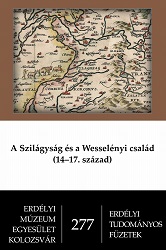

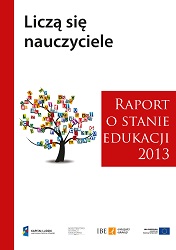
Keywords: education; knowledge; society; education in Poland
Polscy 15-latkowie mają jeden z najwyższych poziomów kompetencji w Europie, na co wskazują wyniki międzynarodowego badania PISA. To w dużym stopniu zasługa nauczycieli i im też w znacznym stopniu poświęcona jest czwarta już edycja raportu o stanie edukacji – „Liczą się nauczyciele”, który opublikował Instytut Badań EdukacyjnychPodobnie jak w poprzednich edycjach raport IBE opisuje kierunki zmian w polskiej edukacji, w tym dotyczące wykształcenia Polaków, ich szans na rynku pracy, ich wyborów edukacyjnych. Stara się też pokazać obraz polskich nauczycieli: dostarcza odpowiedzi m.in. na pytania: co nauczyciele myślą o sobie i swojej pracy?, co inni myślą o nauczycielach?, ile pracują?, jak podnoszą swoje kompetencje? Obszerną cześć raportu stanowią portrety nauczycieli języka polskiego, matematyki, historii, języków obcych oraz nauczycieli przedmiotów przyrodniczych.
More...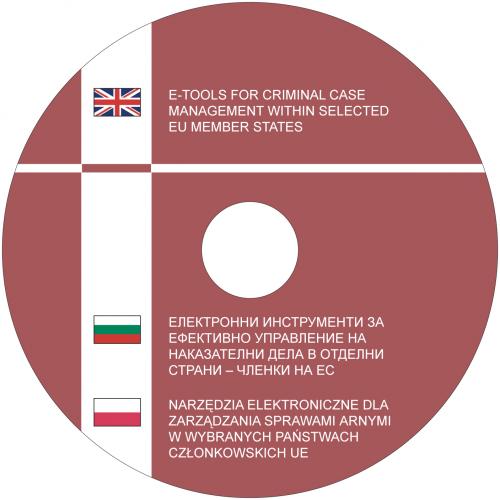
In recent years, public authorities have begun to adopt several statutory reforms to incorporate ICT into everyday tasks of judicial systems’ actors. In the European sphere, the concept of e-justice has been mainly developed in justice administration. This publication provides comparative analysis of current practices of justice record keeping and the electronic tools for measuring the judicial system performance in Finland, Belgium, Greece, Italy, Spain, Germany, and England and Wales as well as an overview of the introduction of ICT in the judiciaries of Bulgaria and Poland.
More...
Keywords: Serbia; social awareness; social crisis; demography; generations; regression; egalitarism; ethnicity; mind-set; history; interpretation; west; manipulation; transition; political crisis; recession; NATO; Kosovo; civic alliance;
(English edition) This report contains the analysis of data collected during the month of October 1999. One should have in mind this time frame-when considering the findings, drawing different generalizations or setting guidelines for possible actions. Sets of values of members of the observed generation, their social awareness, perception of the past and present, their stance on the West, and above all their potential to bring about changes are essentially determined by some long-standing and less intensive structural factors. To put it simply a generation of people who today have between 25 and 35 years, and who represent the future of the country, was to a large extent formed under the influence of structural features of the society eroded by constant wars and war threats, protracted economic crisis, internal conflicts and strife and total confusion in the sphere of social awareness and public moral. The generation which in the last decade came of age in such a society per force had to reflect its essential characteristics, despite a relative autonomy which each age groups had as its inherent characteristic. Young people and even relatively young people, to which the respondents of this survey belong, have a determined biological and psychological potential which can help them partially overcome the given moment of time and which usually indicates some of their future contents and values in the present day. In that sense one could expect that the mind-set of the observed generation substantially differs from so-called social conscience. But in conditions of an ever-deepening social crisis, in which the process of coming-of-age unfolded under pressure of retrograde, rather than progressive social factors, the aforementioned advantages of such a generation are less manifest, since their potential crumbles under pressure of a regressive society. One must bear in mind the aforementioned and thus avoid to treat unjustly the observed age group: they are expected to be the creators of the Serbian society at the beginning of the Twenty-first century, but it is pretty obvious that their social actions will be affected by a sorry legacy of the social and moral collapse. In fact they were not less predestined than the earlier generations to be unequipped for the contemporary world. They simply developed under much less favorable conditions. But this should not minimize their responsibility for the future development of society in Serbia. On the other hand such adverse development factors should be borne in mind if one truly wishes to understand the traits of this generation, instead of bluntly condemning them. My intention is not to prejudge results evidenced by this survey, but it bears mentioning that it is easier to reject the middle generation in Serbia, like Serbia proper, than to try to understand and render assistance to both.
More...
Keywords: Serbia; national program; ethnicity; multiethnicity; trials; war crimes; political ideas; conservative; duke Mihailo; Vojvodina; taxes; Slobodan Milošević;
Neville Chamberlain spoke for millions of his contemporaries when, at the height of the Munich Crisis, he lamented the prospects of going to war over ‘a faraway country’ inhabited by ‘people of whom we know nothing’. The prime minister was, of course, speaking to his fellow Britons about Czechoslovakia. But he could have just as easily used these same words to characterize the Anglo-American world’s knowledge - or concern - about the lands and peoples of the entire region between Germany and the former Soviet Union. A half century later we still know very little about what the Germans call Mitteleuropa, and even less about its history. Even today, as the world press reports recent events in the former Yugoslavia in terrible detail, it has never explained why there is such intense ethnic conflict throughout Central Europe. One tragic consequence of their ignorance has been the incessant, but incorrect allusion to "age-old hatreds" that helped desensitize America’s public and politicians to Slobodan Milošević’s carefully orchestrated campaign of ethnic genocide. We have many excuses. The region's languages are dissimilar to anything we speak. Its multiplicity of intermingled ethnic and linguistic groups challenges the most curious. It boasts no great power to attract our admiration or concern. And, it is not especially strategic or important to us. It may have been only a century ago when Bismarck warned that "the Balkans are not worth the bones of a Pomeranian grenadier", but his advice has guided the statesmen of the West for centuries. But our lack of knowledge or commitment does not mean that we have not played a major role in shaping its past, present, and - as it now seems - future. Although it is true that Central Europe has many endemic problems, the current crisis stems in great part from the West's imposition of its own values and solutions on a region about which it knows little - and cares less. Unfortunately, those in the public sector who mold and make this country’s policy have shown little interest in reading serious historical scholarship. As a result, crucial insights have been lost to the frantic schedules of journalists, who prefer to get their "historical background" from the flip clichés and breezy accounts other journalists. Nor have historical insights gained currency among politicians, who have less time and inclination to read much more than a daily news summary, the requisite opinion polls, and the occasional journalistic account. Thus President Clinton’s memorable remark at a press conference in 1995, in which he justified his belated decision to intervene militarily in Bosnia by proclaiming that he now understood the situation, having just read reporter Robert Kaplan’s Balkan Ghosts. Even those social scientists who serve as area specialists for central Europe have tended to restrict their historical background to the previous generation or two, failing to see how anything that occurred before World War II could possibly inform our understanding of the events of the last decade; hence the broad currency given to political scientist Susan Woodward’s Balkan Tragedy: Chaos and Dissolution after the Cold War, which convincingly ascribes the events of the last decade to a failure of that country’s governmental leaders and institutions, without regard to underlying, historically-informed cultural forces that might have prompted that collapse. The devaluation of history by the public, press, politicians, and social scientists presents a formidable challenge to us as historians. Surely we have a vocational interest in reminding them of our ability to discern the continuity between the past and present as an instrument for determining the likely course(s) of future developments. To this I would add a second, moral imperative to repay the tax- and tuition-paying public that sustains us by contributing to the formulation of public policy. The past decade has exposed us to the tragic alternative. In the aftermath of Srebrenica, Operation Storm and the successful NATO intervention, there has evolved a broad consensus that attributes the war, genocide and the subsequent need for costly, long-term Western intervention to our failure to learn from the lessons of history. I would suggest that part of our responsibility lies in a failure of historians to teach these lessons beyond the narrow confines of the Ivory Tower. Perhaps most remiss have been Habsburg scholars, who have failed to share what they have learned about the multiethnic experience in a "western" institutional environment that upholds the rule of law and codes of professional conduct. To Balkan and Habsburg historians alike, I say that it is not so difficult for a reasonably intelligent person to understand how we have gotten to this terrible juncture in Central Europe, or to envision where we are heading. The answers to our questions are not unteachable, just untaught. Looking over the events of the past decade, I would suggest a number of historically informed insights that bridge the gap between scholarly discourse and the lay public’s self-professed factual ignorance and conceptual confusion.
More...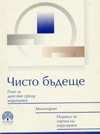
The Anti-Corruption Action Plan has been developed within the framework of the Coalition 2000 process with the purpose of becoming part of the social agenda as a broadly approved system of measures and actions for curbing the extremely dangerous social phenomenon of corruption. The Anti-Corruption Action Plan gained credit as a document, which was often referred to in Bulgaria and used in other countries as a model for mapping out national anti-corruption priorities. In the words of George Soros, the Bulgarian anti-corruption plan is the most comprehensive and ambitious document of its kind.
More...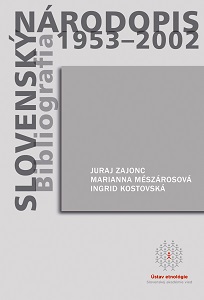
Keywords: Slovenský národopis; bibliography; 1953-2002;
Bibliographic catalog of the magazine Slovenský národopis (1953 - 2002)
More...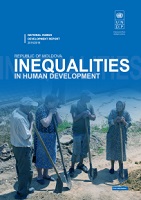
Instead of an Abstract/Summary here, please refer to the Introduction PDF-file which includes the Executive Summary. Thank You.
More...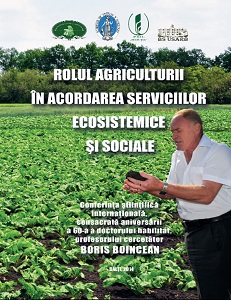
Keywords: ecology; economy of nature; ecosisteme; sol fertil; humus; tehnologii; organic system; bio-degradation of soil
Capitolul II cuprinde materialele comunicărilor prezentate în cadrul Conferinţei ştiinţifice internaţionale Rolul agriculturii în acordarea serviciilor ecosistemice şi sociale.
More...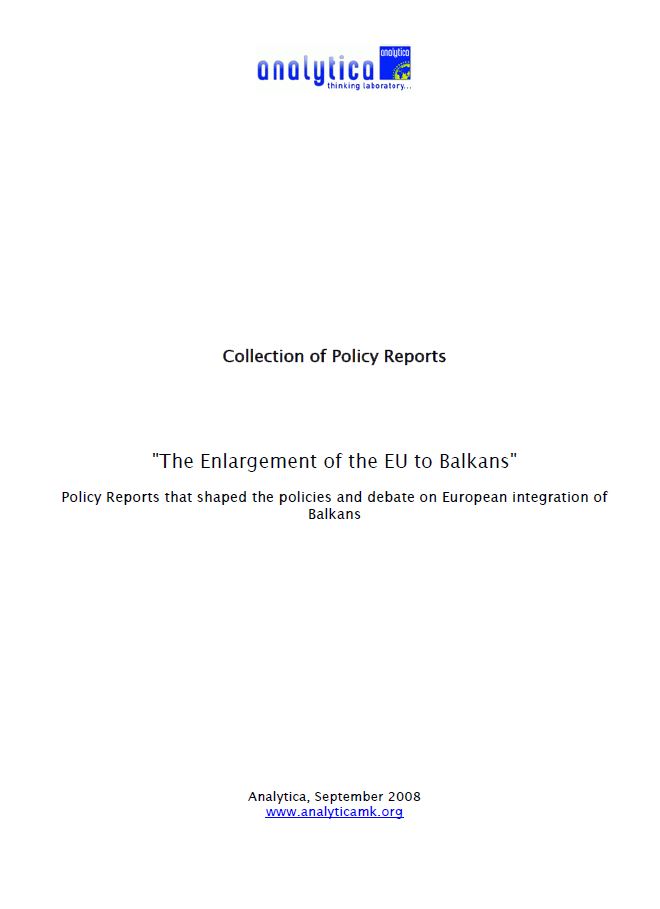
Keywords: Western Balkans; Stabilization and Accession Process; EU integration; European financial assistance; national governments; peace; stability; development; EU policy towards Balkans;
Today, western Balkans states are a long way from where they were at the beginning of the decade. The Stabilization and Association process, which has just started in 2000, is almost completed as all the states have negotiated and signed the Stabilization and Association Agreements with the EU, the EU is negotiating visa liberalization agreements and all states are entitled to the new pre-accession financial assistance IPA, designed to address the strategic needs of the region. This progress, apart from the persistent efforts of the national governments and the EU administration, is also partly due to the visionary policy reports and recommendations of people and organizations working on the Balkans. We are convinced that their commitment to the region and the ability to look beyond the limitations of the immediate political context for lasting solutions makes them an irreplaceable item on every reading-list of both those who wish to study the Balkan region and those who aim to produce similar such reports addressing the present dilemmas and challenges for the western Balkan states. “The Enlargement of the EU to Balkans” is a compilation of four reports on the Balkans published since 2000. They all concern the Balkan region and its prospects for the future – away from violent legacies towards peace, stability and European integration. As such, they are a valuable source for all those interested in and studying the recent political developments in this region, for these reports give an overview of the challenges that Balkans states faced on the start of their journey to European integration. We hope this collection of reports will become part of the curricula of schools and departments where Balkan politics, history and EU integration are taught. From the multitude of reports, books and other works written on the Balkans, the reports that follow were not chosen accidentally. Rather, we aimed to include the most influential reports, those which had the greatest impact on the EU and international community’s approach towards the Balkans, those with the most valuable recommendations concerning the features of EU’s policy towards the Balkans. The results of in-depth field research and analysis of diplomatic relations in the region, these reports provided the most credible assistance to the European and other policy-makers when faced with the dilemma ‘how to deal with postconflict post-Milosevic Balkans?’ By publishing their reports again, we also like to pay tribute to those people and organizations that made their most for Balkans to be found in EU integration map.
More...
Keywords: extremism; social evil; anti-fascism; Serbia; woman; politics; crime; hatred; law; minority; radicalization; hooliganism; social norms;
Pojava ekstremne desnice i desničarske ideologije u Srbiji posledica su strukturalnih promena nakon razgradnje socijalističke države. Ratovi devedestih vođenih sa idejom o prekomponovanju Balkana, odnosno s idejom o Velikoj Srbiji (Memorandumu Srpske akademije nauka i umetnosti, 1986), samo su jedan od ideoloških osnova na kojima još uvek opstaje desna misao. Njene osnovne karakteristike jesu: etnička homogenizacija, težnja za stapanjem državnih i etničkih granica, antikomunizam i negiranje antifašizma, jačanje tradicionalizma i autoritarnosti, pravoslavlje tretirano kao superiorna religija u odnosu na ostale etničke i religijske grupe (posebno Hrvate, Muslimane i Albance), otpor idejama multikulturalizma i kosmopolitizma i netrpeljivost prema “novim” (LGBT popuacija) i tradicionalnim manjinama (Romi). Zajedničko svim desničarskim pokretima koji se pozivaju na ekstremni srpski nacionalizam i fundamentalističke interpretacije pravoslavlja, odnosno svetosavlja, jeste i izrazita islamofobija i neprijateljski stav prema svemu što je islamsko.
More...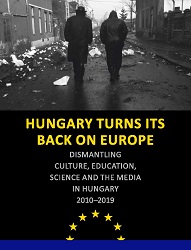
Keywords: democratic deficit; autocratic power; illiberal state; culture; education; science; media; Autonomy; civil society, intellectuals; European values
This report has been prepared by independent Hungarian intellectuals who wish to inform the Hungarian and international public as well as European institutions about the severe harm that the Orbán regime governing Hungary since 2010 has caused in the fields of education, science, culture, and the media. The reason for preparing the present report is that the acts of the successive Orbán governments consistently run counter to and consciously violate the fundamental principles, values, and norms of the European Union, not only as regards the rule of law and political and social rights, but also in the case of the cultural areas discussed here. In Hungary, important European values are being jeopardised, including cultural diversity, scientific and artistic autonomy, the respect for human dignity, access to education and culture, conditions for social mobility, the integration of disadvantaged social groups, the protection of cultural heritage, and the right to balanced information, as well as democratic norms like ensuring social dialogue, transparency and subsidiarity. By presenting the activities of the Orbán regime in the fields of culture, education, research, and the media, we provide information about areas little known to the international public. With our report, we wish to draw attention to the fact that an autocratic system has been constructed and consolidated in Hungary with the money of EU taxpayers and with the financial and political support of EU institutions. This system creates a worrying democratic deficit and severe social problems, while it also causes irreparable harm in the fields of education, science, and culture. The authors of the report are leading researchers, lecturers, and acknowledged experts, including several academicians, professors, heads of departments, and a former Minister of Culture. The undertaking was initiated and coordinated by the Hungarian Network of Academics
More...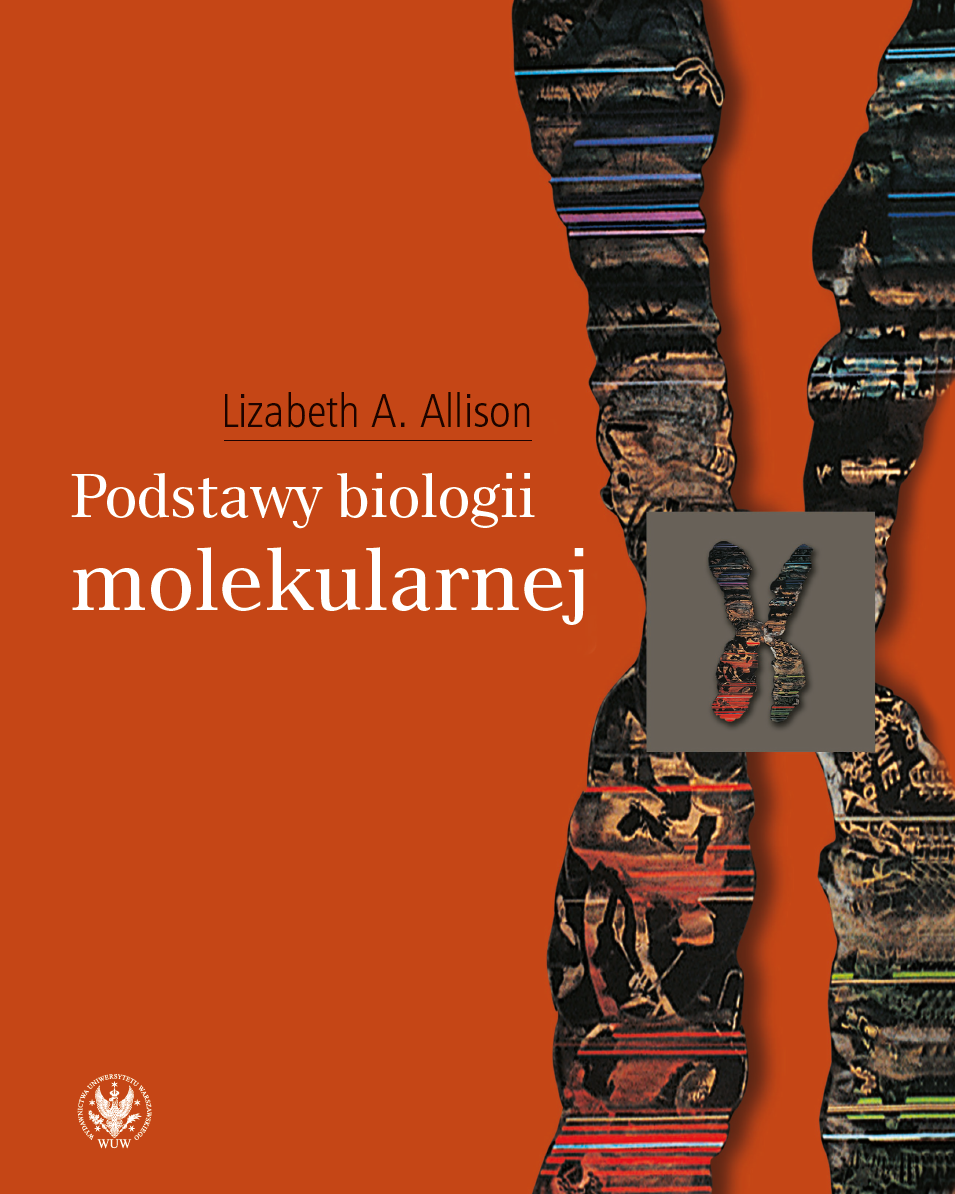
Keywords: molecular biology; genetics; gene; DNA; RNA; genome; protein; inheritance; medicine
Academic textbook presenting topics from the field of molecular biology. The author discusses fundamental concepts and processes from genetics, such as siRNA, genomic imprinting, structures of DNA, RNA, RNA as catalyst, etc. She presents the key methods and techniques of molecular biology. The textbook includes a description of human genetic diseases, which are caused by dysfunctions of particular processes taking place in the cells. The text is illustrated with numerous photographs, diagrams and figures.
More...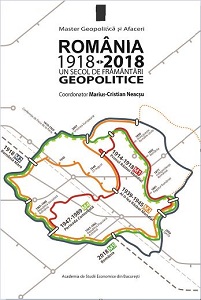
Keywords: Romania; Romanian Centenary (1918-2018); geopolitics of Romania; the Romanian school of geopolitics; Geopolitics and Business MA; geography; Bucharest University of Economic Studies
The volume entitled Romania 1918-2018. One century of geopolitical concerns (coordinated by Associated Professor Marius-Cristian Neacșu, PhD) is the fruit of the efforts and scientific research of the Geopolitics and Business Master Program, within the Bucharest University of Economic Studies, with the participation of both consecrated (professors) and early staged researchers (final year MA students), in a perfect symbiosis, on one hand by virtue of a noble ideal - the appearance in and under the auspices of ASE Bucharest in this important anniversary year, the Centenary of the Great Union (1918-2018) – and, on the other hand, as a proof of the Romanian higher education quality, through relevance, rigor and scientific accuracy of the information. Thus, the paper presents a particular interest, with regards to the subjects as well as its contribution to the understanding of the context and the geopolitical and geoeconomic Romanian framework, its dynamics over the last 100 years, with current implications on the regional and national business environment.The thematic area underlying this volume of studies and researches is Geohistory, Geopolitics and Geoeconomics, being structured in 15 studies, within three parts: Part I. The Centenary of Romania (1. The complicated geopolitical position of Romania, Marius-Cristian NEACȘU); Part II. One century of geopolitical concerns (2. Romania in World War I, Marian TUCĂ; 3. Nicolae Iorga and the Great Union. Geopolitical and geohistorical contributions, Clara NAE; 4. Romania between 1918 and 1944, Beatrice AVRAM; 5. The population of Romania in the interwar period, Bogdan ȚEBREAN; 6. The economy of Romania in the interwar period, Cătălin CONSTANTINESCU; 7. Romania during the communist regime, Roxana MATEI; 8. Romania after 1989, Laura-Iulia CIUPERCĂ; 9. Romania's relations with its neighbouring countries 1918-2018, Alina GHERGHINA, 10. Romanian-Russian relations 1918-2018, Marian TUCĂ); Part III. Geography and Geopolitics. The Romanian School (11. Simion Mehedinți, precursor of the Romanian school of geopolitics, Marius-Cristian NEACȘU; 12. Romania in the Romanian geopolitical studies in the first half of the 20th century, Silviu NEGUȚ, Marius-Cristian NEACȘU; 13. The contribution of Romanian geographers to the construction of modern Romania. Paris Peace Conference, 1919-1920, Marius-Cristian NEACȘU, Gheorghe VLĂSCEANU; 14. Simion Mehedinți, the great absent of Paris Peace Conference, 1919-1920, Marius-Cristian NEACȘU; 15. A long century of geography at Bucharest University of Economic Studies. The Master Program of Geopolitics and Business, Marius-Cristian NEACȘU).
More...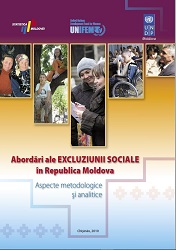
Keywords: quality of life, social justice; social exclsion; social cohesion;
Creating the conditions for improving the quality of life of the population by developing an economically competitive society, based on knowledge, capable of sustainable economic growth, jobs and high social cohesion is the fundamental objective of the National Development Strategy for 2008 -2011 (SND) of the Republic of Moldova. However, the problems of poverty continue to persist both nationally and globally, prompting experts in the field to investigate the causes and mechanisms that favor this condition in order to reduce the risks of social exclusion. // PUBLISHED BY UNDP (MOLDOVA), UNIFEM UNITED NATIONS DEVELOPMENT FUND FOR WOMEN, NATIONAL BUREAU OF STATISTICS (MOLDOVA)
More...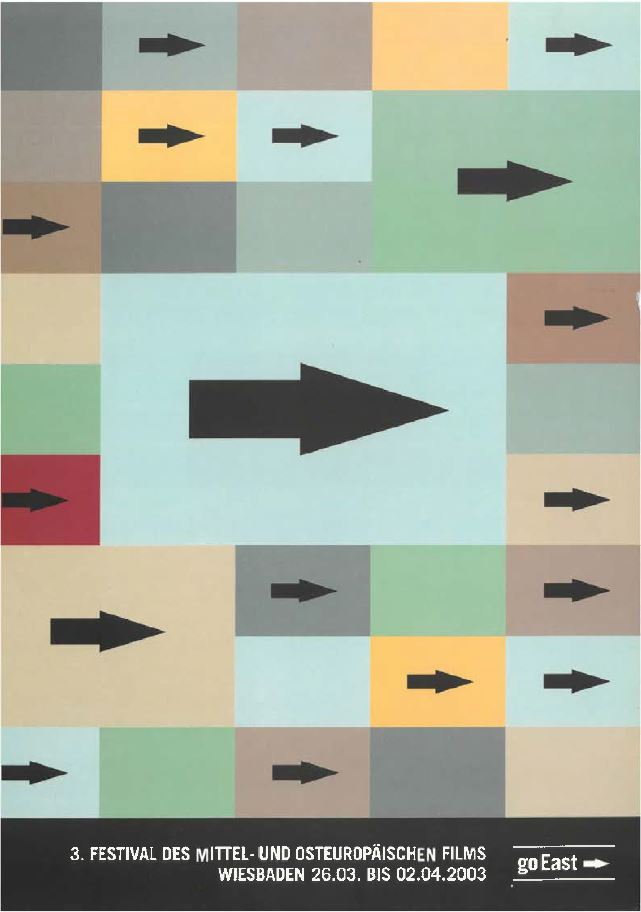
Keywords: festival;catalogue;film;
More...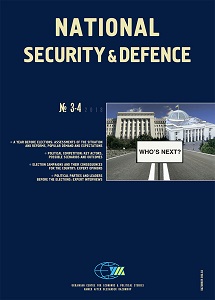
UKRAINE ON THE EVE OF ELECTION YEAR: PUBLIC DEMAND,POSITIONS OF POLITICAL ACTORS, OUTLINE OF THE NEW GOVERNMENT // UKRAINIAN SOCIETY ENTERING THE ELECTION YEAR // CITIZENS’ ATTITUDES TOWARDS POLICY ALTERNATIVES IN VARIOUS SPHERES // THE STRUCTURE OF POLITICAL COMPETITION AND SUBSTANTIVE ASPECTS OF 2019 ELECTION CAMPAIGNS // POLITICAL LEADERS ON THE UPCOMING ELECTIONS AND THE COUNTRY’S PROSPECTS // THE 2019 PRESIDENTIAL AND PARLIAMENTARY ELECTIONS: EXPERT INTERVIEWS // THE UKRAINIANS ABOUT THE GOVERNMENT, STATE POLICY AND ELECTIONS: FOCUS GROUP DISCUSSIONS // POLITICAL PARTIES OF UKRAINE, IDEOLOGIES AND POLICIES: THE EXPERT SURVEY
More...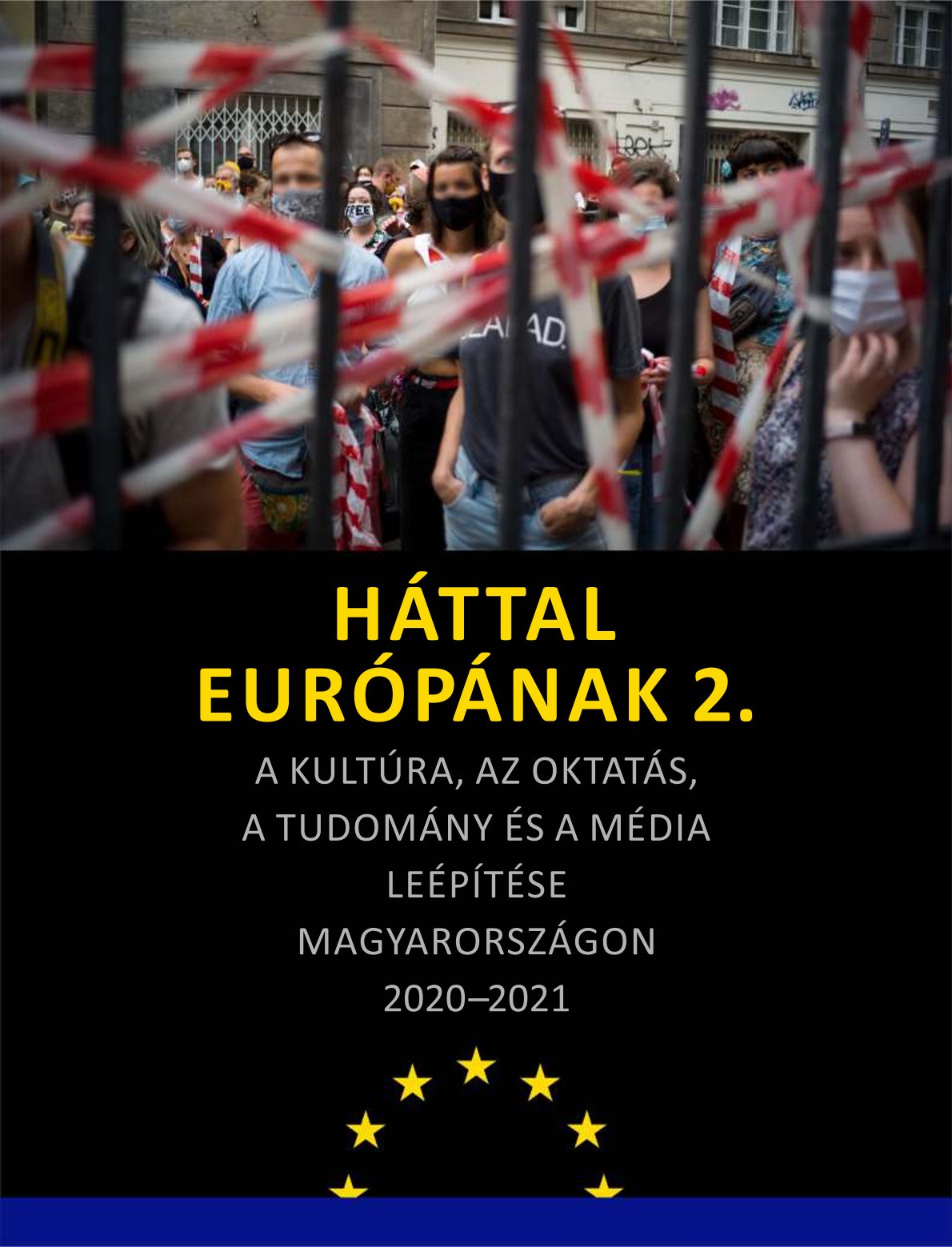
Keywords: culture; education; science; media; Hungary; Orbán-regime; government; corruption
With this volume, we continue our "Hungary turns its back on Europe" report, which was finalised in autumn 2019 and published in January 2020, "prepared by independent Hungarian intellectuals who wish to inform the Hungarian and international public as well as European institutions about the severe harm that the Orbán regime governing Hungary since 2010 has caused in the fields of education, science, culture, and the media." The reason for carrying on with our work is that, in the meantime, the situation in Hungary has exacerbated: the authoritarian features of the Orbán regime have been further strengthened, dismantling of the rule of law has continued, and the government's "cultural warfare" has moved up a gear and is increasingly destructive in the domain of culture. It is our common experience that Hungary, using European Union funds, has built an openly anti‐European, 21st century autocracy, which has taken the state captive, dismantled the checks and balances essential to the rule of law, turned democratic institutions into an empty shell, invaded the media and made corruption systemic.
More...